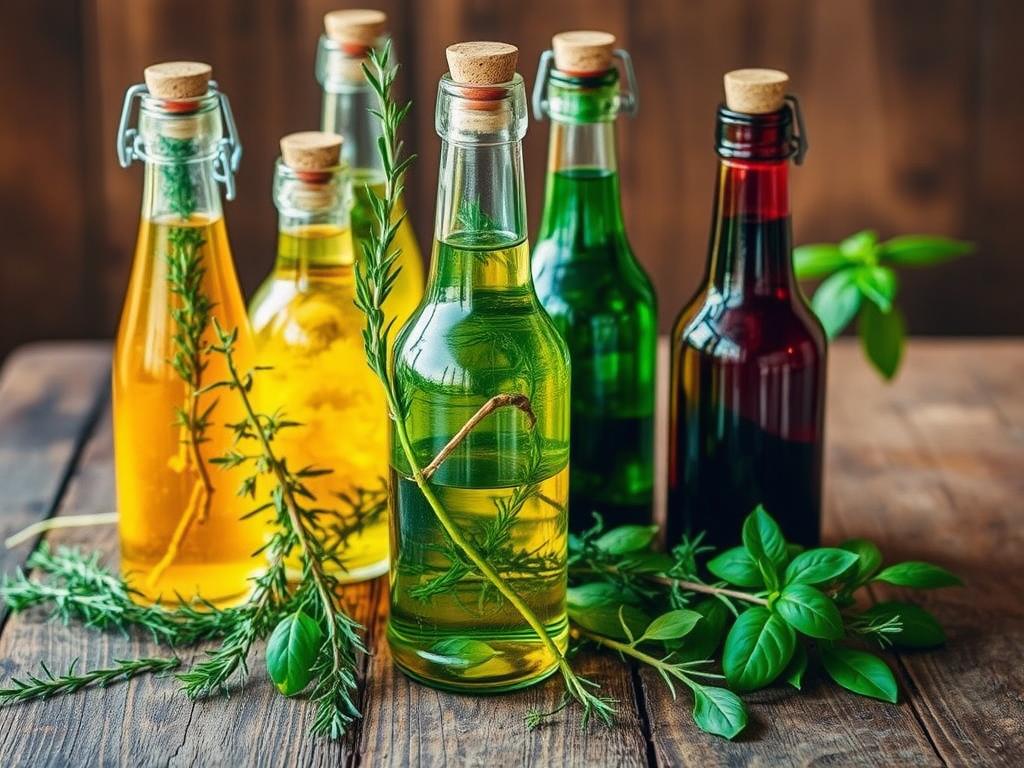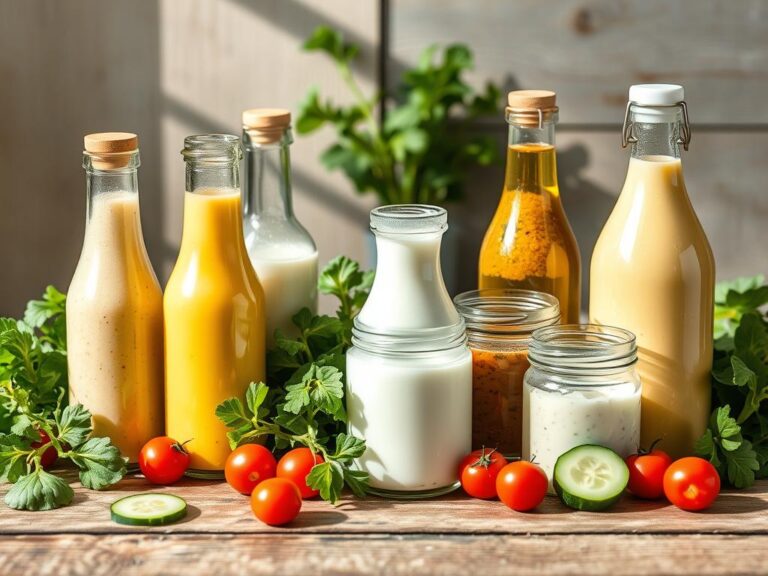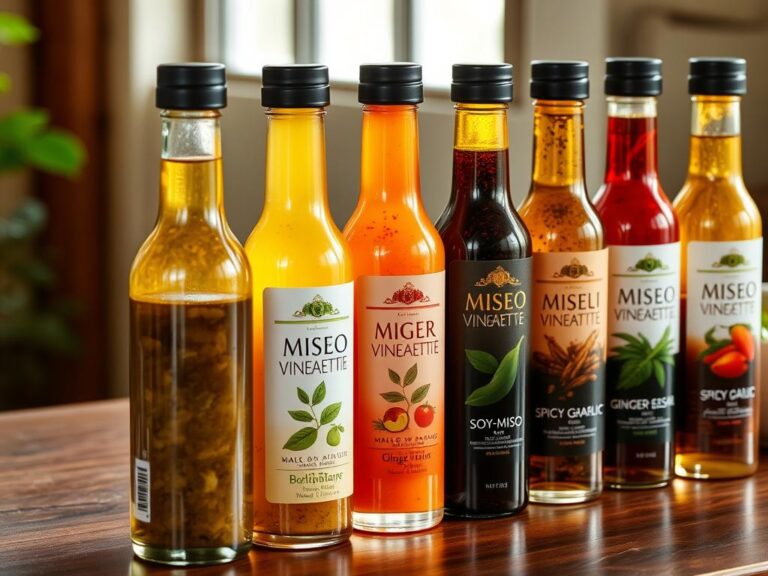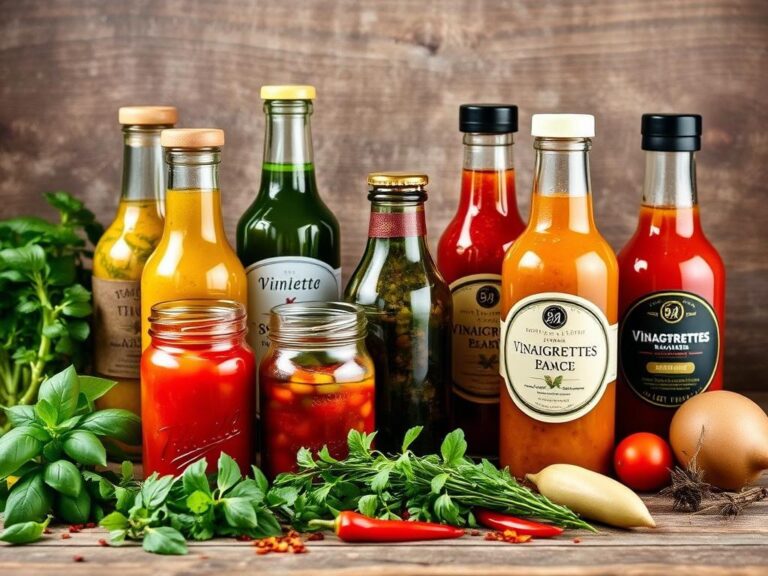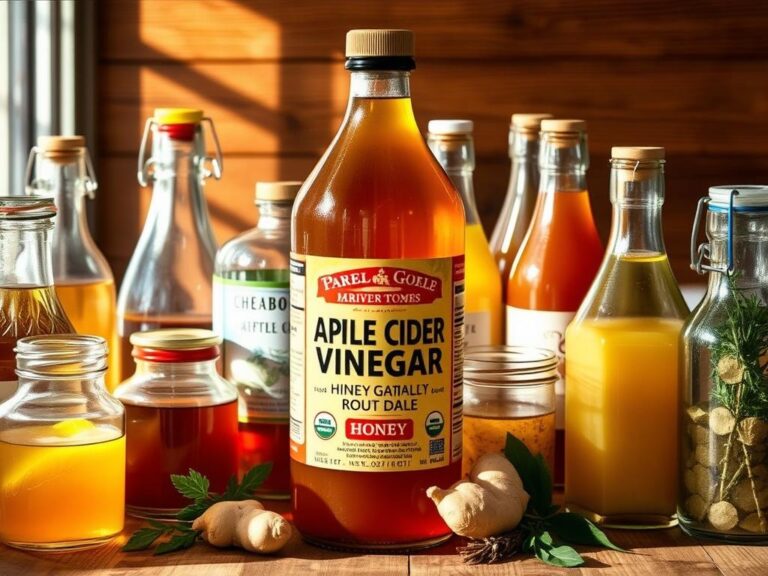10 Herb-Infused Vinegar Dressings
This post may contain affiliate links which means I may receive a commission for purchases made through links at no extra cost to you. I only recommend products I truly believe in. Thank you for your support!
Ready to change your cooking with 10 Herb-Infused Vinegar Dressings? Our homemade vinegar recipes will make your kitchen shine. They turn simple salads into gourmet dishes. These herbal vinegar recipes celebrate fresh, vibrant flavors.
Making your own herb-infused vinegars is easy. Just a few fresh herbs and quality vinegar are needed. Each tablespoon has only 4 calories and zero fat, making them a healthy choice.
Our guide shows you how to make tasty dressings with herbs like basil, thyme, and rosemary. Whether you’re a pro chef or new to cooking, these homemade vinegar dressings will make your meals exciting.
Imagine drizzling a tarragon-infused vinaigrette over a crisp salad or using a garlic-herb dressing on roasted veggies. These dressings are more than just condiments. They’re culinary magic for your kitchen.
Introduction to Herb-Infused Vinegar Dressings
Home cooks are finding out how great DIY herb-infused vinegar is. It makes simple meals taste amazing with just a little effort.
What Are Herb-Infused Vinegar Dressings?
Herb-infused salad dressings are made by soaking herbs in vinegar. This lets the herbs’ oils and scents mix into a tasty sauce. It can make any dish better.
- Vinegar base with 5% minimum acidity
- Fresh herbs infused at a 2:1 ratio
- Extraction time of 2-4 weeks
Benefits of Using Vinegar Dressings
Making your own herb-infused vinegar dressings has many perks. They’re healthier than store-bought ones and you can change the flavors to your liking.
| Benefit | Description |
|---|---|
| Cost-Effective | Significantly cheaper than premium store brands |
| Health Advantages | Rich in antioxidants from fresh herbs |
| Flavor Customization | Unlimited herb and vinegar combinations |
Learning about herb-infused vinegars opens up a world of kitchen creativity.
Essential Herbs for Infusing
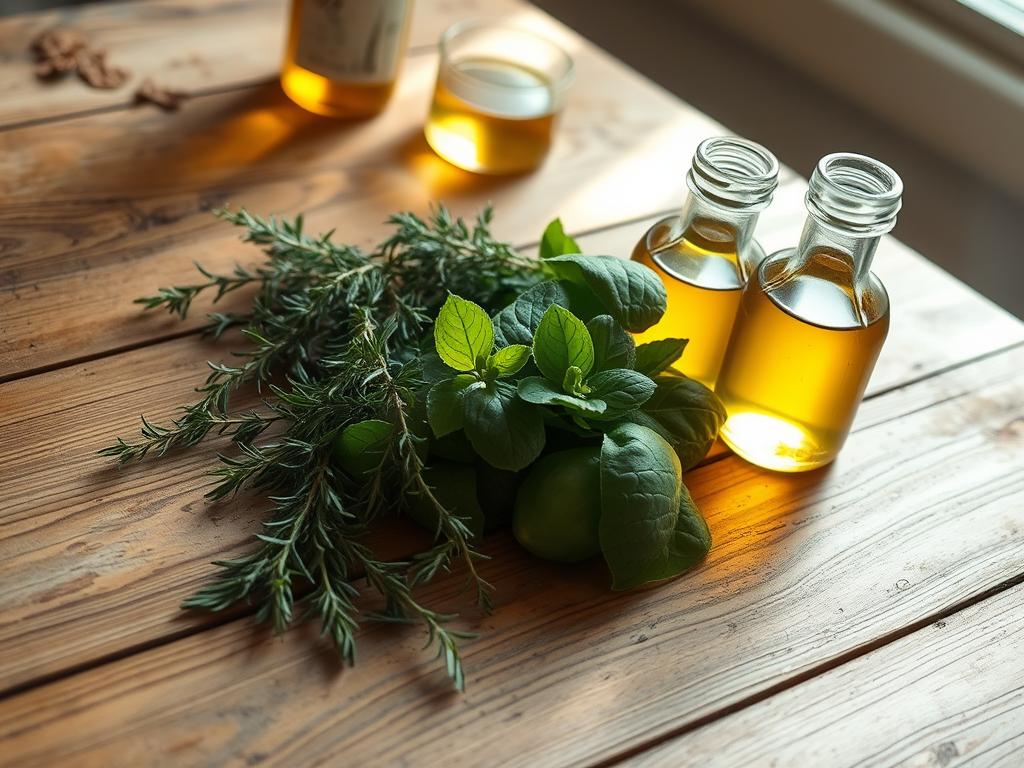
Creating tasty vinegar dressings begins with picking the right herbs. The art of infusing vinegar with herbs goes back to the Babylonians. They first tried herb and spice flavors thousands of years ago. Your infused vinegar recipes can turn simple dressings into culinary wonders.
When looking at vinegar dressing ideas, three herbs are top picks for their great flavors:
Basil: The Sweet Fragrance
Basil adds a sweet, peppery taste to your vinegar recipes. This Mediterranean herb pairs well with white wine and apple cider vinegar. Its delicate leaves give an aromatic profile that makes simple dressings taste like gourmet dishes.
Oregano: A Mediterranean Classic
Oregano has a strong, earthy flavor that’s great for vinegar dressings. It’s a staple in Mediterranean cooking, adding depth to your vinegar infusions. Its bold taste goes well with red wine vinegar.
Thyme: Earthy and Aromatic
Thyme brings an earthy and slightly minty flavor to your vinegar dressing ideas. It’s versatile and can go with different vinegars, making interesting taste combinations.
| Herb | Flavor Profile | Best Vinegar Pairing | Infusion Time |
|---|---|---|---|
| Basil | Sweet, Peppery | White Wine Vinegar | 1-2 weeks |
| Oregano | Robust, Earthy | Red Wine Vinegar | 2-3 weeks |
| Thyme | Earthy, Minty | Apple Cider Vinegar | 1-4 weeks |
Pro tip: Use about 3 tablespoons of dried herbs or 3-4 fresh herb sprigs per pint of vinegar to make your perfect infusion.
Choosing Your Vinegar
Starting with the right vinegar is key to making tasty homemade vinegar dressings. The type of vinegar you pick can change the taste of your DIY herb-infused vinegar. Let’s look at three great vinegar options that will make your dishes better.
Apple Cider Vinegar: A Tangy Twist
Apple cider vinegar adds a fruity and tangy taste to herbal vinegar marinades. It has 4-5% acetic acid, giving it a mild yet complex flavor. People like it for its natural sweetness and health perks.
Great for lighter dressings and marinades, it goes well with herbs like thyme and rosemary.
Balsamic Vinegar: Rich and Sweet
Balsamic vinegar is known for its rich, sweet taste in homemade vinegar dressings. It has about 6% acetic acid, making it a classic from Italy. Its strong flavor is perfect with Mediterranean herbs like basil and oregano.
Red Wine Vinegar: Bold and Flavorful
Red wine vinegar has a bold, strong taste that’s great for hearty vinegar marinades. It has 6-7% acetic acid, making it a solid base for herb-infused dishes. It pairs well with strong herbs like:
- Rosemary
- Thyme
- Sage
When making your herbal vinegar marinades, remember the vinegar choice is as important as the herbs. Try different types to find your favorite flavor mix!
How to Infuse Your Vinegar
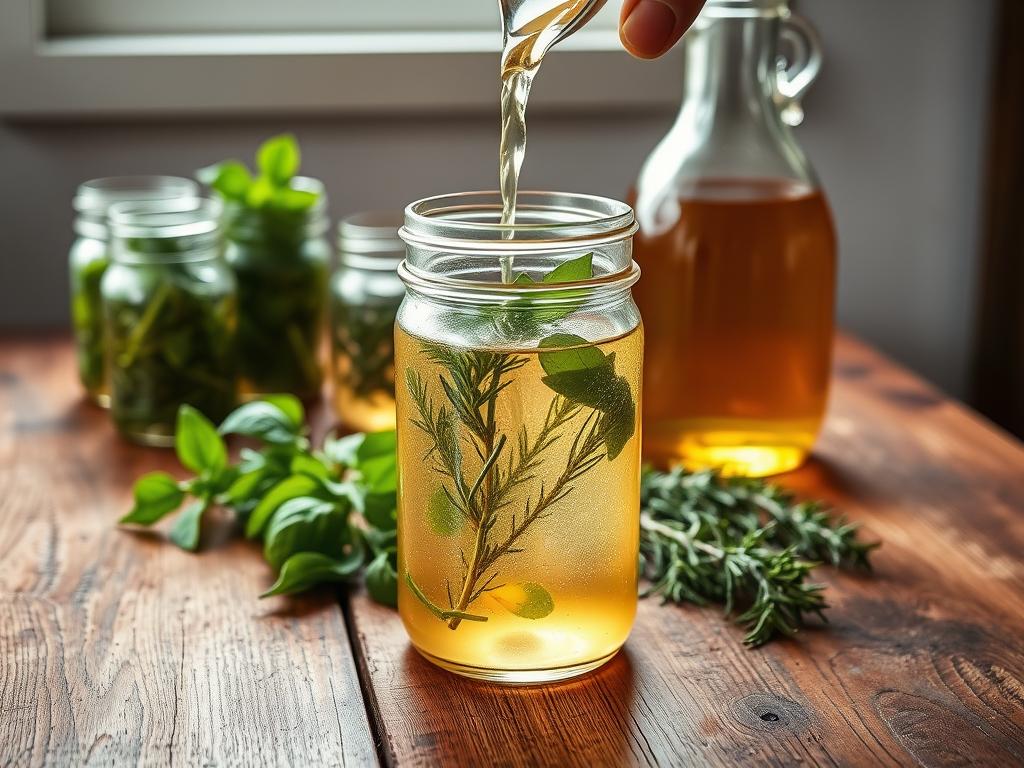
Making homemade vinegar dressings is all about learning to infuse herbs into vinegar. These easy recipes add vibrant flavors to your cooking. They’re simple to make and fun to try.
Essential Steps for Herbal Vinegar Recipes
To make herbal vinegar, you need to be precise and careful. Here are the main steps to follow:
- Pick fresh, quality herbs
- Thoroughly wash and dry the herbs
- Gently crush the herbs to release oils
- Choose your vinegar base
Infusion Techniques and Timing
The infusion process turns regular vinegar into a flavorful treasure. Knowing the right techniques is key to getting the most flavor.
| Infusion Method | Steeping Time | Herb Quantity |
|---|---|---|
| Cold Infusion | 2-3 weeks | 1 cup fresh herbs |
| Heated Method | 1 week | 2 tablespoons dried herbs |
When making vinegar dressings, patience is key. Let your herbs infuse fully for the best taste.
Storage and Preservation Tips
- Keep it in a cool, dark spot
- Use clean, sterilized glass jars
- Strain herbs after infusion
- Use within 1 month for the best taste
Your homemade herb-infused vinegar will make salads and marinades taste amazing. It’s easy to make and adds a lot of flavor.
Classic Herb-Infused Dressing Recipes
Turning your kitchen into a gourmet dressing station is simple. With a few vinegar dressing ideas, you can make dressings that make any salad special.
Making infused vinegar recipes is easy but packs a big flavor punch. Let’s dive into two classic herb-infused dressings that will be favorites in your kitchen.
Basil and Garlic Infused Dressing
This dressing mixes the scent of fresh basil with garlic’s strong taste. Here’s a quick guide:
- Prep time: 5 minutes
- Yield: Approximately 300ml
- Servings: 20 (15ml per serving)
| Ingredient | Quantity |
|---|---|
| Fresh basil leaves | 1/2 cup |
| Garlic cloves | 2-3 minced |
| Olive oil | 3/4 cup |
| Infused herb vinegar | 1/4 cup |
Oregano and Lemon Zest Vinaigrette
This vinaigrette is bright and zesty, adding Mediterranean flavors to your dishes. It’s also good for you, making it a guilt-free choice:
- Calories per serving: 83 kcal
- Total fat: 8g
- Preparation time: Under 10 minutes
Pro tip: Let your dressings sit for 20 minutes before serving. This lets the herbs fully release their flavor, making your meal unforgettable.
Unique Flavor Combinations
Making herb-infused salad dressings is like mixing art and science. It lets home cooks try new flavors that make meals exciting.
Trying out new flavor mixes can make your dressings stand out. Let’s look at two great recipes that show how unexpected pairings can be amazing.
Rosemary and Fig Balsamic Dressing
This dressing mixes the earthy taste of rosemary with the sweet figs. It’s a mix that’s both complex and delicious. It’s great on salads and roasted veggies.
- Fresh rosemary sprigs (3-4)
- High-quality balsamic vinegar
- Dried figs (chopped)
Cilantro and Lime Dressing
This dressing is bright and zesty. It combines lime’s citrus with cilantro’s fresh taste. It’s perfect for salads or as a marinade for grilled meats.
| Ingredient | Quantity | Purpose |
|---|---|---|
| Fresh Cilantro | 1/4 cup | Herbal base |
| Lime Juice | 2 tablespoons | Citrus brightness |
| Olive Oil | 1/2 cup | Smooth texture |
When making these dressings, remember the key: 2 parts oil to 1 part vinegar. This keeps your dressing balanced every time.
Using Herb-Infused Dressings
Herbal vinegar marinades are more than just salad toppings. They can add depth and complexity to many dishes.
Vinegar dressing ideas go beyond salads. Let’s look at creative ways to use these versatile condiments in your cooking.
Elevating Salads with Herbal Vinegars
Fresh salads get a boost from herb-infused dressings. Try these pairings:
- Mixed green salads with basil-infused vinaigrette
- Roasted vegetable salads drizzled with thyme dressing
- Grain salads enhanced by oregano-based vinaigrettes
Versatile Drizzling Techniques
Your homemade herbal vinegar marinades can enhance various dishes:
- Drizzle over roasted vegetables
- Use as a marinade for grilled meats
- Splash into grain bowls for extra flavor
| Dish Type | Recommended Vinegar Dressing |
|---|---|
| Grilled Chicken | Rosemary-infused red wine vinegar |
| Quinoa Salad | Lemon-thyme apple cider vinaigrette |
| Roasted Root Vegetables | Garlic and oregano balsamic dressing |
With these vinegar dressing ideas, you can turn simple meals into amazing dishes. Remember, a little herbal vinegar marinade can make a big difference in your cooking!
Storage Tips and Shelf Life
When making your own herb-infused vinegar, knowing how to store it is key. This way, your homemade vinegar dressings can stay fresh for a long time. White distilled vinegar stays good for ages. Herbal vinegars, on the other hand, are best for 4-6 months.
Best Practices for Storing Infused Dressings
Keep your herbal vinegar in clean, sterilized glass containers with tight lids. Place them in a cool, dark spot, away from sunlight and heat. Refrigeration helps keep your DIY vinegar fresh, even more so with fresh herbs. Look out for mold, cloudiness, or strange smells. If you see any, throw it away right away.
How Long Do They Last?
Most homemade vinegar dressings stay great for 4-6 months if stored right. Vinegars with dried herbs can last up to 1-5 years. But, fresh herb vinegars don’t last as long. Vinegar itself lasts almost forever, but the herbs can affect how long it stays good. Always check if it looks, smells, or tastes right. If not, make a new batch.
